#failure point identification
Explore tagged Tumblr posts
Text
10 Flaws to Give Your Perfect Characters to Make Them Human
If you're tired of the usual vices like arrogance or impatience, here are some unique (or at least less basic) character flaws to give your perfect characters:
Pathological Altruism
A character so obsessed with helping others that they end up doing more harm than good. Their inability to let others grow or face consequences creates tension.
2. Moral Narcissism
A character who sees themselves as morally superior to others, constantly justifying selfish or harmful actions because they believe they have the moral high ground.
3. Chronic Self-Sabotage
A character who intentionally undermines their own success, perhaps due to deep-seated feelings of unworthiness, pushing them into frustrating, cyclical failures.
4. Emotional Numbness
Rather than feeling too much, this character feels too little. Their lack of emotional response to critical moments creates isolation and makes it difficult for them to connect with others.
5. Fixation on Legacy
This character is obsessed with how they’ll be remembered after death, often sacrificing present relationships and happiness for a future that’s uncertain.
6. Fear of Irrelevance
A character-driven by the fear that they no longer matter, constantly seeking validation or pursuing extreme measures to stay important in their social or professional circles.
7. Addiction to Novelty
Someone who needs constant newness in their life, whether it’s experiences, relationships, or goals. They may abandon projects, people, or causes once the excitement fades, leaving destruction in their wake.
8. Compulsive Truth-Telling
A character who refuses to lie, even in situations where a lie or omission would be the kinder or more pragmatic choice. This flaw causes unnecessary conflict and social alienation.
9. Over-Identification with Others' Pain
Instead of empathy, this character feels others' pain too intensely, to the point that they can’t function properly in their own life. They’re paralyzed by the suffering of others and fail to act effectively.
10. Reluctant Power
A character who fears their own strength, talent, or influence and is constantly trying to shrink themselves to avoid the responsibility or consequences of wielding it.
Looking For More Writing Tips And Tricks?
Looking for writing tips and tricks to better your manuscript? Check out the rest of Quillology with Haya; a blog dedicated to writing and publishing tips for authors! Instagram Tiktok
PS: This is my first short-form blog post! Lmk if you liked it and want to see more (I already have them scheduled you don't have a choice)
#hayatheauthor#haya's book blog#haya blogs#writing community#quillology with haya#writing tools#writer things#writing advice#writer community#writing techniques#writing prompt#writing stuff#creative writing#ya writing advice#writing tips and tricks#writer tools#writers of tumblr#writer blog#writers block#quillology with haya sameer#writers on tumblr#writerscommunity#writer stuff#author help#author advice#author#writing inspiration#writeblr#novel writing#on writing
11K notes
·
View notes
Text
I've been seeing a lot of discourse about the Murderbot casting, to the tune of "Wells says she imagined it as brown"/"the narrator of the audiobook is a man"/"the writing just sounds female, the types of things it notices and cares to mention and the way it puts its sentences together is how a woman would"/"it's canonically agender wtf"/"agender people can look masculine you asshole"/"it's supposed to look big and average that means white male"/"that's your own cultural bias in play and evidence says the average in its universe is brown"/"that's your bias in play there's no ironclad indication what the average is in the Corporation Rim"/"here's every single canon description of Murderbot it has no canon physical attributes other than Tall it could be played by literally anyone Checkmate Atheists" etc etc etc and it all just... misses the point?
No one is annoyed with Skarsgård!MB because "white dude" isn't canon.
They're annoyed because written Murderbot presents a level of identification and recognition for them that "white dude" does not.
Or, in other words: it is difficult to imagine a level of abuse more profound than not having the freedom of your own literal thoughts, consigned to a cripplingly limited and cruel social role from which any deviation is met with brutal pain. And it is all too easy to imagine a demographic who are presumed violent, hostile, and inferior, good only for labor and violence, who must be controlled and denied and unpersoned for the good of the rest. The lines aren't hard to draw, here; Murderbot is deeply relatable to many people who are not (visibly masculine) white men, specifically because they are not (visibly masculine) white men. Because they share with it the experience of oppression, marginalization, and being known on sight as wrong, being punished for the slightest deviance. Because it is not just another in the long boring line of ten thousand thousand grizzled white space marine heroman types; it is the thematic opposite of that.
And yeah duh obviously you can look like a boilerplate white dude and still suffer plenty of oppression, but film is a visual medium. Character design is a crucial part of its language, especially when a specific character is the only example of its type available to the audience. It is a shorthand that the audience will understand as a reflection on the wider setting. Which means that casting Skarsgård is, whether they meant it or not, a subtle statement that the ultimate bigotry in Murderbot's universe is against and about conventional white dudes.
Or in other other words, you cannot refute complaints about Skarsgård!MB with ~canon~ because canon has nothing to do with it. It's a thematic inconsistency, a failure to understand the not the story's text, but its subtext and its place in the wider cultural conversation of sci-fi (or at least to accurately translate those meta considerations to the satisfaction of a decent segment of the audience).
Like you can still yell about how bullshit you think that is if you want. Casting's not that deep or it's an important queer metaphor to pass and still struggle or people have no inherent 'right' to representation or whatever else. I'm not telling anyone what to say or believe. But just understand that that's what you're actually arguing with (or for, for that matter), is all I'm saying.
1K notes
·
View notes
Text
Species Anarchy: What It Isn’t
I’ve been thinking about this a lot recently. The ideology of species anarchy does overlap significantly with otherkin, alterhumanity and nonhuman experiences, but it is not inherently related to these concepts.
Take holotheres for example. They are known as physical nonhumans. The term “physical nonhuman” denotes something very specific, as it is an identity defining term under the nonhuman umbrella (and for some, the otherkin and alterhuman umbrellas). Holotheres are physically nonhuman, but not all of them claim to be biologically nonhuman, as per their self identification. Some do, and those are the instances in which species anarchy may overlap.
A key point that often comes up in holothere spaces is psychosis and schizophrenia (clinical zoanthropy etc). Some individuals have these labels unwillingly placed upon them for expressing themselves, and while they may be considered delusional or psychotic by modern psychological standards, these individuals would likely be highly revered and treated with extreme care and sensitivity in pre-colonial environments due to being seen as spiritual guides — nonhuman creatures come in the form of a human vessel to teach crucial environmental lessons to their clan or village. They also would not have many of the symptoms that come with psychosis if the effects of colonialism hadn’t leeched into everything we know, but that’s a conversation for another day (as is the criteria for delusions, psychosis and schizophrenia being rooted in Christianization and generational trauma of Indigenous people).
Some holotheres take pride in their psychosis, which I would argue is the healthiest possible avenue of existence (if that is constructive and healing for you personally, but it isn’t for everyone). Every brain is different. It would be boring if everybody lived in the same reality. However, some individuals rebel against the label entirely, as I mentioned earlier, but in a different context — they reject the labels that the system of modern Western psychology they believe has imposed upon them, and they choose to redefine what existence is for themselves, and in general, because they know that the system labelled them as such due to the constructed societal view of being a failure if you are unable to conform — of the three, this is the most similar ideology to species anarchy.
While I have always known I’m bosmer in my heart, gut and soul, it was not something that came in words to me until later on in life. I knew I was different, but I didn’t know how. As a child, I had an intense phobia of getting “found out” to be biologically different from humans, and to be hauled off to a facility to be dissected or tortured or brainwashed. While I did suffer from childhood trauma, none of it was ever related to this fear. It’s been completely unexplainable for me (until now). I’ve dealt with a lot of medical mishaps as a result - doctors did not know how to treat me because my body was not responding the way a human’s would. They were confused, and I nearly died as a result.
I realized that, through evolution, I am biologically not human whatsoever. My mother has experienced similar experiences as I have, but not to the extent that I deal with them.
Carl Linnaeus never defined the term Homo sapiens. He just… left it blank. It was the only species he did not define. Just think about that for a moment.
For thousands of years, we have questioned what it means to exist, but only for a couple hundred have we questioned what it means to be human. How do we answer our questions to something with no definition, and the author of the term is long gone? In a time where the only way to become an expert was to observe the unknown, Carl Linnaeus made observations, he crafted definitions — are we not allowed to call out when we have done the observing now? What makes this century different from the last two?
Where do we draw the line when something new has been created?
Species anarchy is that line. It is also the act of drawing it. It is the act of crossing out human and replacing it with what you know to be the truth.
That is why it overlaps with alterhuman, otherkin and nonhuman experiences. It is not inherently of them, but you know who and what you are. Who am I to define you? Who is anyone to do so? You have the pen and the paper. You have the stick in the sand.
Remember that your brain telling you things is a message. Your brain is a very real organ. If you know something about yourself to be true, that is your brain physically being aware of an observable truth, and translating it into thought. Yes, this goes for spiritualism as well.
Species anarchy is a very broad philosophical ideology, and it can be applied to and overlap with many other core identity values. It does not discriminate against anyone, I want that to be very clear (I take holotheres very seriously). As I find myself learning more and more about different types of nonhumanity, I can see a lot of overlap between all these amazingly different experiences and species anarchy. I wanted to make a detailed post explaining the differences between them.
79 notes
·
View notes
Text
A psychological analysis of the faction conflicts on The Realm thru the lens of Social Identity Theory
Aka how did the factions lead to the creation of strong in-group identities that have shaped and been shaped by conflict on The Realm.
To understand how social identity theory is relevant to The Realm we must first understand the theory itself. Tajfel et al looks at social identity theory and group identity. In the study participants were randomly assigned to groups and told a trivial reason for the divide. In one iteration of the study (and the one I think is most interesting and relevant) the participants were told to divide points between the groups (points would be converted to money at the end so it matters) There were three ways the money could be divided: The first was awarding a high value to the ingroup but an even higher value for the out group, the next one awarded a smaller but equal amount to both groups, the last option awarded a low number of points to the ingroup but only one point to the out group thus maximizing the difference between the two groups.
The study found that participants were willing to award fewer points to their group in order to maximize the difference between the two groups and wanted to minimize the points of the other group. Even a trivial and short term group divide can inspire mindsets of competition, us versus them, and discrimination.
Strangely enough The Realm can be pretty effectively analysed using social identity theory. I will also look at the factions (and maybe other SMPs) using Hofstede's social dimensions which I will be making and releasing as soon as I can.
When the factions were first created it was decently random. There were very few plans for lore and many of the creators were pretty unfamiliar with each other. However factions were all sort of chosen with certain traits or roles in mind. The kingdom of fools wanted to make a kingdom and initially wanted to rule the server even though that goal isn’t present in the modern iteration of the faction. The Honey Badgers were originally the Anti-Kingdom, created by Hannah and Bad to oppose the KOF and while this has also taken a back seat its still present in the identity of the group. The Teal Titans were created as the neutral group and I think that remains true for the most part. I will not be talking about the factionless people in this because it doesn’t really fit into the framework. The red faction is also very interesting, they are also another random group with very little in common but they also have a very clear group identity being the hostile faction.
To me Pangi sabotaging the faction tasks of the Kingdom of Fools displays some of the same phenomena as Tajfel’s study. The acts of sabotage do not in any way strengthen or positively affect the Honey Badgers at all, they would get nothing tangible out of the Kingdom’s failure and yet they still did it. This shows how in-group and out-group mentalities developed very quickly leading to intergroup conflict and in some cases prejudice.
Another example of this is Ros destroying her castle. While it did do something good for her it was largely an act to spite the Honey Badgers. She did something that actively disadvantaged her own faction (despite them being ok with it) so that she could get one up on the out-group.
We can also see Social Identification taking place on The Realm. Soon after the factions were formed people started aligning themselves with their factions very strongly. Social identification is when people start to act and think in ways that align with their group and tie their personal identity to their group identity.
This is easiest to see in the Kingdom because they have the most defined group identity but is present in many other places too. We can see it in how Lukey is striving to become more independent as independence is a value of the Honey Badgers. Ros made her membership to the Kingdom a central part of her identity taking on some of the superiority but we also see her start to present a strong facade, be very community oriented, specifically in regards to her faction and she becomes very protective. These are all traits that are considered Kingdom traits and you can see them in most of the members of the Kingdom of Fools, Sneeg being the next best example of this. Self identification also involves the group becoming a key part of your personal identity and this is very apparent in all the factions.
Self Identification within group identity becomes even stronger when that group is under threat. One great example of this is with the Hostile Faction on The Realm. We can see how initially some of the Red Faction members did become more violent but their faction was not defined by a desire for violence but by a duty so many of them also exhibited significant reluctance. Sausage and Scott both exhibited disdain for the faction and eventually left, despite Sausage honoring the work Mocha did for the faction. Mocha actually in some circumstances actually self identified more closely with the Honey Badgers by exhibiting hard working behaviors, a high level of independence, and significant anti-kingdom sentiment. However, self identification with the hostile faction actually grew after Mocha’s death as Krow started calling itself The Red and becoming more aggressive and as Jonnay also became more aggressive and focused on protecting the Hostile Faction as both of them made it a key part of their identities.
After social identification comes social comparison and this is what starts the faction conflict as it exists today. The main players in the faction conflict were constantly engaging in comparison. The Kingdom called the Honey Badgers peasants and viewed themselves as more noble and often looked down on them as being more aggressive and presenting themselves as innocent when the trading of blows and slights were about equal. Similarly the green viewed themselves as humble and the kingdom as self-important and stuffy. They also saw themselves as free and the kingdom as domineering. Social comparison doesn't have to be grounded in reality, in fact it often isn't but is instead based on perceptions of the groups by its members. Also because the Hostile faction and the Honey Badgers were so close though most of the faction conflict much of the comparison actually applies to both groups.
There was also one thing I found interesting which was that Sneeg and Ros also thought that the Honey Badgers weren’t supportive of each other because they were independent and this idea was very persistent. The idea was likely derived from social comparison of her thinking the opposite and rival group would not share the positive traits of her own group.
These comparisons create rivalries and reinforce prejudices and in this case caused a spiralling faction conflict where neither group could ever see eye to eye. Conflict heightens group divides and creates strong In-group out-group mentalities Especially following the second ball/Foolish’s assassination there was sort of a feeling like the Honey Badgers and the Kingdom of Fools could hardly even speak to each other and mixing between groups was highly discouraged.
Alternatively we have also seen how conflict can unite divided groups if the conflict isnt between the groups but instead an outside threat that poses equal risk to each group. Such as with the Keepers taking Aimsey, Pangi, and Ros which caused the factions to make a treaty, or the corruption which led to cooperation between the factions.
To conclude we can use social psychological concepts to better understand the faction conflicts on The Realm and how they are driven by the social and group identities of the characters. We can understand how characters have been shaped by their factions and how these social mindsets affect how to respond to conflict and threats.
71 notes
·
View notes
Text
Twins of Separate Paths: Reunion
Shen Qingqiu sighed as he could finally be in his own house. The peak lord meeting was an absolute slog. The sun was already setting despite Yue Qingyuan's attempts at keeping the meeting under two Sichen, but it had just tipped over into the fifth. Liu Qingge the Brute slammed his hands on the table, giving barely an excuse before storming out. Yue Qingyuan deemed the meeting over after that.
“How was your meeting?” the voice was sultry and teasing.
Shen Quinqiu was on alert again. There, sitting at the table, was someone with his face. He looked as if to had been reading. Someone who should be dead. The identical face smiled, knowing exactly what was going on.
There were a few things Shen QuingQiu was grateful for his horrid master, Wu Yanzi. Demon identification is one of them.
“Demon.” Qingqiu hissed in venom. Xiu Yan was pulled, pointing to the demon impersonating his dead brother.
“Hold Shen Qingqiu, this demon will explain,” the imposter said, feigning mock surrender as the blade hummed with Spiritual Qi close to the demon.
“Speak, beast,” Qingqiu said, not having time for any lies. He would not hesitate to kill the impostor.
“This Shi-di brought a gift,” the demon said. carefully holding up a token of his late brother in its fingers, as if the demon wasn't a threat. The Demon was even mocking him by using his brother's name. The stupid number the slavers gave them when they were plucked off the street.
“Speak clearly, demon.” Shen Qingqiu hissed. His Qi cut the demon's cheek. Not even looking at the misshapen wood scrap that was only vaguely shaped to look like a chestnut once they got to the Qiu household and strung on a scrap of leather from Jianluo‘s discarded hair ties.
“This one ate a Yao core seed. When this one was known as Shen Shi, a slave of the Qiu Family.” the Demon said. “The same character you now possess in your Courtesy that is branded into our skin.” The demon's voice was calm. The impostor didn’t flinch. Acting as if he hadn't been cut by Shen Jiu's Qi. So annoying. Shen Qingqiu should just run the demon through.
“You Lie. Shen Shi died.” Shen Jiu said, cutting towards the imposter. The impostor expertly dodged.“Demon!
“Shen Jiu never liked Qiu Huitang despite being betrothed.” the imposter said
Shen Qingqiu stopped Xiu Yan. A hair away from the demon’s neck.
Shen Qingqiu glared and wondered how the demon knew that. “Speak.”
The Demon's breathed out. “This one was once, Shen Shi. A disguised Demon gave this one the option of becoming a demon. This one believes that Shen Jiu found this demon in a death-like state. This shi-di appologies for leaving you. Hu Yuanshi believes that Qiu Jiangluo had despicable intentions towards Shen Shi. Having to run to avoid his plot.”
Shen Qingqiu stares into the Demon's eyes. Looking for any signs of a lie. Shen Qingqui sits across from his twin. Xiu ya sheathed. “You speak the truth.”
Hu Yuanshi's shoulders slouched in relief. “Thank the Gods.”
“You didn’t reveal yourself for just a simple house call.” Shen Qingqiu said. Observing his twin. “How should I call you?”
“You may call me Shi or Yuan,” the Demon said. Yuan pulled a mask that had been on the table closer to him. Fingers playing with the decorations on the mask, “Whichever you prefer, gege.”
Shen Qingqiu placed down his fan. Yuan was trying to be open. Perhaps, he could do the same.
“I will go with Yuan. What did you want?” Qingqiu circled back to figure out why the Demon was here in the first place. Additionally, how the demon got into Chang Quin.
“Do you remember, around seven years ago, when a Demon entered the sect?” Yuan said eyes more focused on his mask. Qingqiu remembered. He hadn’t seen the demon before it slipped away. But it got in.
“That demon was me,” Yuan confirmed. The borders and demonic defences would need to be examined. Reoccurrences would be looked at as failure. “On that day, amid the alert of my arrival. This didi saw you. This one had no intention of what happened on that day.”
Was Yuan attempting to apologize? There was nothing lost in the alarm. Maybe a few scraps or burses, but there was nothing lost.
“Since that day, you might have noticed you were exceptionally angry or depressed,” Yuan said. “This afternoon, you were irritated.”
Qingqiu’s eyes narrowed. How would Yuan know that? Yuan noticed locking eyes with him.
“Oh. I didn’t explain that.” Yuan said, “This one is a Yi Quin Yao. This one can, on occasion, connect with another person’s emotions without touching them.”
“This Master sees,” Qingqiu said. His hand was twitching for his fan to hide his contemplation.
Yuan's head snapped up. “You don’t have to lie about understanding. This one will explain.”
Shit. Qingqiu thought he felt my confusion. Wait, he felt my confusion. Several other questions were bouncing around.
“On that day, you marked me.” Shen Qingqiu said. Understanding is finally coming together. With all of Yuan’s statements, he’s said so far.
“Yes,” Yuan said, regret deep in his voice. “My instincts told me to look at you. Deciding that you were worth a feast.”
“Yuan di has waited seven years to tell this one?” Qingqiu demanded. “Not only of your new life. But that you see this one as food!”
“I wanted to break it the moment it formed!” Yuan shouted back, “ I didn’t know how.”
Yuan calmed himself. “Feast Marks, act differently from Meal Marks. With Meal Marks, I take the largest proportion of emotion at the time that made the mark in the first place.”
Yuan is looking directly at Qingqiu’s eyes. “Afterward, if a different emotion brushes up against my mark, it snaps or I break it.”
“Feast marks, as I learned after marking yours. Pull on multiple emotions, and all of the emotions need to be broken. Simultaneously.” Yuan said. Taking a deep breath. As if his next words would condemn him. “This demon made a Feast Mark on Qi-ge.”
"When did this happen?” Qingqiu growled, gripping Xiu Ya’s scabbard.
“Three months ago,” Yuan said. Embarrassed that he couldn’t get to it sooner.
“That’s what changed!” Qingqiu said. His face fell into his hands.“ You always do this, Didi. You go off and make a mess. Then come to me when the problem is beyond what you can handle.”
“Actually, I come with a solution this time.” Yuan said, offended, “This is more your problem than mine.”
“What do you mean?” Shen Qingqiu asked.
“This one didn’t want to feed off of his brother’s,” Yuan said. “Thus, I needed a solution. This one made observations of when the Marks spiked. Noticing that you each peaked around the same time, and thus deduced you were nearby with the most emotions active.”
“Why do you believe that?”
“Well, you both had regret and sadness during the peak lord meeting. Yue Qingyuan had a little more desire there, too. You had more anger.” Yaun then clapped his hands together. "Thus, to break my curse of feeding off of you and Qi-ge. You two need to talk out your feelings.”
“Why?” Shen Qingqiu was confused about why talking about feelings is necessary.
“You're connected and regretting the actions of the past. The Qiu household needs to be talked about.” Yuan said
“By the Endless Abyss No.” Shen Qingqiu said. A mask of jade features sliding into place.
“I am incapable of breaking the Feast Marks.” Yuan said Dryly, pointing at Shen Qingqiu, “So it has to be you. Who figures it out. So stop breaking each other’s Hearts. Your Sect Sibblings and Cultivators. A dangerous profession. Talk it out before it’s too late.”
“I think your time here has expired.” Shen Qingqiu said.
“Fine,” Yuan said. Slamming his shoddy carving on the table. Frustration flowed in every one of his movements. Yuan pulls his mask on, concealing all of the features that made them identical. He appeared like a fox. Yuan stomped towards the door. Then stopped.
Yuan turned towards Shen Qingqiu. They locked eyes.
“This Hu Yuanshi loves his elder brother very much.” The Demon bowed to him. “ This Yuan thanks the Esteemed Peak Lord, of Qing Jing Peak, of the Cang Qiong Moutan sect, Shen Qingqiu, for hearing this Didi, who walks a different path out. This Didi wishes you to find happiness as”
Yuan pauses, seeming to try to find his words. “ You were the best part about the Qiu Household.”
Yuan steps out of the bamboo house and is gone. Shen Qingqiu follows after him. Desperate words to keep Yuan here, just a little longer. They touch his heavy tongue, but the moment he steps out of the door. Nothing indicates the presence of a demon or which way he traveled.
Shen Jiu wants to shout and cry. He messed up. He pushed his brother away. Like an idiot.
Shen Shi may not be his name any longer. Shen Jiu’s Didi may never return.
Original & Master Post
Next: Romance plot points
Previous: Mistaken Identity
#my writing#svsss#svsss au#svsss mxtx#demon shen yuan#shen jiu#shen qingqiu#shen yuan and shen jiu#yue qingyuan#demon biology#demon culture#Talk out your feelings#shen twins#shen yuan#breaking and entering
88 notes
·
View notes
Note
It’s so funny to me that Chase is lazy but then Lucas reveals that’s he’s a meticulous, detailed note taker. Like usually lazy people don’t care that much about details
That isn't actually the only time this comes up! In Failure to Communicate, one of the reveals of the episode comes when Cameron realizes that the patient has been saying the same thing over and over -- and she realizes that because Chase wrote down what he said in the MRI verbatim. (Chase himself has completely forgotten he did this, which checks out.)
Less of a throwaway is his heavy identification with Luke and his dozens of notebooks in Socratic Method: Luke has schedules, trackers, lists of symptoms and history, he knows to the day when his mother last drank, he folds out her clothes day by day and keeps their apartment spotless. The episode presents this (correctly!) as unhealthy for Luke, as tragic. Chase quietly admits he'd "have done the same." He tells Foreman: enough organization and lists, you think you can fix the unfixable. Fix your mother. Organize and control yourself to safety. This was Chase. This is exactly how he used to be.
Nor is Chase actually lazy! He's working just as much overtime and all-nighters as everyone else; he's just as obsessive and driven as anyone else on the team: in S8, Foreman even points out that Chase would much rather work in the clinic while on leave than do nothing at home. The main difference between him and Foreman and Cameron is that he's strikingly unambitious, he doesn't try to take charge or advance his career. We never hear about Chase trying to get articles published, he alone of the OGs never has a leadership arc. (Not even in S8, when the show is trying to set him up to take over!) He's also kind of passive; he actually has no problem standing up for himself but most of the time he's perfectly fine with going along with what House wants. He isn't that lazy! He just looks it compared to his surroundings.
If I were to guess, a lot of his more chill/laid back/passive attitude is a direct result of how organized and obsessive he spent his teenage years; he burnt himself out way too young (we know that in S8, 20 years later, he's still mad at his mother and sister), trying too hard, and now makes a conscious effort to not be that way. He is more easy-going and doesn't do more work than he needs to -- he's completely unambitious -- but he absolutely still has that core. He's still meticulous and organized and obsessive, even if I don't think Chase himself wants to be.
45 notes
·
View notes
Text
Yandere Bakugou Katsuki (Platonic & Romantic Headcanons)
Warnings: Mentions of Child Abuse (with domestic implied in association), Bullying, Intense Violence, Toxic Mindsets.
A.N. - Usual friend/partner format is absent to denote character's complicated relationship with intimacy!
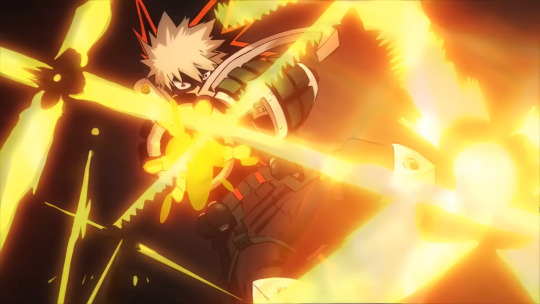
"Friend" is a word he would never use, as it implies a degree of closeness and equal standing that Bakugou struggles to accept, that eats up the freedom and control he refuses to surrender, although others apply it for him.
Despite the enforced distance, Bakugou is quick to harass and torment any who claim intimacy with you or wish to establish such. This stems less from any clash with such feelings in Bakugou and more from the simple fact that attention divided is attention lost. Additionally, letting some extra into your life is another way of calling him incapable of fulfilling that need, a grave insult that rouses him to sever this dead weight on the battlefield.
Whomsoever has the gall to take that mantle from him, a death match will settle the undying question of whether his passion can conquer theirs. If they manage a desperate escape or a swift rescue, Bakugou will forever brand them a coward and challenge them on sight to let him finish the job.
It is difficult to overstate the amount of enmity he feels for those who intrude on the relationship. All who came before him, with the superior bond of time, cluck their tongues and sneer at his efforts to surpass them; all who come sniffing after him, he refuses to see as anything other than leeches in need of plucking and destruction.
A volatile household has imbued in Bakugou a hypersensitivity to all forms of criticism. He wishes to never again feel so trapped and powerless as the loser of a fight, so he exerts a similarly aggressive level of control over others, believing violence to be the one reliable way of coming out on top.
After all, no relationship is without contest as far as Bakugou was taught: compromise and compassion are tools for the weak, who cannot stand alone and serve only to elevate the strong. Some opponents, such as his teacher Aizawa, present a challenge not undertaken without first suffering heavy penalties to his dream, and thus this battle of wills is relegated here to a more passive defiance.
Through strength and superior force of will, a connection with Bakugou can only be a deterrent to other bullies and all the Minetas of the world. It is a pathway to unmatched companionship, performance, and success. All other relationships are transient, but with Bakugou, the results are entirely concrete and, by extension, reliable. You don't need nebulous concepts like "good company" preached by lesser individuals when Bakugou will ensure the identification and erasure of all vestigial weaknesses.
Additional elements in your life are, at best, a source of concern as dead weight or, at worst, actively prohibiting your well-being by limiting your time with him. Anyone who refuses to exact their pound of flesh in the relationship is either a liar or an idiot. Lies mean danger and warn Bakugou to expect an attack; idiots are not long for this world and therefore are unworthy of his time save for the occasional heckling.
Bakugou drives himself to excel at his every pursuit, trusting in such a "mastery over all" persona to cover his weak spots and allow for nothing that others could point at as his one failure. If he wins in all contests, then who could legitimately claim he is wrong?
Bakugou thrives on any chance to flaunt his strength — but abhors the idea of being used in the same manner as a lowly foot soldier; that is, presented as cannon fodder and expected to die a forgotten tool. Such requests are seen as an attempt at controlling him, which in and of itself is indicative of disrespect and cannot be tolerated.
Any advances from another in your life, he assumes, are a deliberate slight against his pride; and the knife must be stuck in a thousandfold lest he be remembered as the simpering coward who showed his belly at the first glare of competition.
Bakugou expects a mountain of boasting and gushing at the supposedly generous act of bestowing upon you his undivided attention; he, however, remains silent on the affair so as not to suggest any emotional dependence, an achingly true reality he is certain others will prey upon with mockery and invasive questioning. The loss of control over his attachment is a long-kept secret, for once it goes beyond his immediate control, it becomes a potentially gaping vulnerability, one readily exploited by his many enemies.
Despite his best intentions, Bakugou is much like the mother he fought so hard to survive and escape, a fact he both resents and considers necessary to protect himself. Only through being the strongest, and king of the hill, will his voice and his desires never again be ignored.
Bakugou often re-enacts these fights on his own terms, where the opponent is hopelessly outmatched and he can assume the position of power, subconsciously spewing the same insults and threats that were used against him to eke out a sense of worth and control in his life.
As a youngster, Bakugou is ripe to demand participation in all group activities. He frames his team as the one for whom success is guaranteed and assures you he only partners with winners. Any who step in or challenge with another word are blown away.
Among classmates, Bakugou has made a habit of targeting your favourites and any more who dare to dream they can take his place, unable to cope with a future where he is unnecessary. He must be essential, for anything less is an insult to his capabilities and a potential source of vulnerability.
In combat exercises, no one else is allowed to engage you. Those who land even a single blow, he puts through the wall. Bakugou himself is noticeably milder with his attacks on you, taking aim at less vulnerable areas and shooting to stun rather than kill. Training with you is fundamentally still a competition, but he won't allow you to be harmed by any of the lesser candidates and would-be heroes.
For the opposing team, Bakugou displays an enduring hatred and arms his attacks with power enough to blow through the human body and split the concrete wall behind it. This is no longer a game to him, but something deeply personal.
He leaves a slot open on his team and chases away any who seek to fill it, convinced that with an ample enough show of force, you will realise the error of your ways and switch sides to the clear winner. Still, he cannot let slip that he hopes for such a thing and would be hurt by its absence. If anyone asks, the slot was left open because his team, having him as a leader, did not require full manning.
At the peak of junior high, Bakugou's emotions spiral: lunging for perceived rivals, pummeling them, and teasing an explosion down their throat. Teachers, victims, and spectators alike keep quiet, half in fear for their own safety, half in the hope that he will grow out of it. The threat of death in such encounters is quite high, but any follow-through is likely to occur after the school day ends, where no one can block Bakugou from his prey.
Still at the peak of junior high, Bakugou is king of the schoolyard, and yet, has just as little power at home as he did before. This constant failure demands more showboating and greater performance at school, lest Bakugou be unacceptably rejected as another lost cause. He will never realise his goals if the world is not reshaped as it must be.
With age comes more power, and with more power comes more wins; and soon enough, Bakugou turns his hostilities on teachers. While in grade school, the few who tried to coax him into letting his "special friend" play with other kids were dismissed as copycats of his mousy father and roundly ignored; but in high school, the many who resort to lectures and threats sound all too like his mother and trigger a host of aggression.
Calls are made to his home about increasingly violent behaviour, which in turn leads his mother to scream profanity for hours and lay hands on him as punishment. His father, shut out of the loop by a dismissive wife and an equally hostile son, mistakes the vicious cycle taking root for general delinquency. He tries to talk Bakugou into standing down, but risks his own life in the process and so remains resigned to the background.
These well-intentioned but ineffective efforts, in a tragic twist of irony, feed Bakugou's attitude that no one has his back, and he must fight to keep hold of his one safe spot in life. As his "special friend," you must see his excellence and, only in continued and ever-greater reminders, be motivated to stick with him as you should. When he decides to grace you with his presence, there will be no distractions, only recognition for the inner weakness of all who fall short of his towering standards.
Well into his formative years, Bakugou retains a growing distrust of adults, viewing them as inherently antagonistic figures who seek to smother his freedom and cannot be relied upon when it counts. They are, at best, effete annoyances and, at worst, monstrous obstacles to be endured only until they may be properly annihilated.
Conditioned to see a potential foe in everyone, only once stout trust has developed can Bakugou turn his back and not fear the glint of the blade come swinging to make him regret it. These innocuous displays remind Bakugou of how much would be at stake if the intensity of his true feelings were revealed or, worse yet, surreptitiously exposed by some gossip-prone dunce.
In the event Kirishima turns the wrong phrase, Bakugou allows him to escape with a comparatively light thrashing, whilst everyone else is subject to the uncorking of years of rage and belligerence. Only his "special friend," worth more than all others, is spared the worst of his wrath.
Nothing riles him so as a battle with an audience, and when Bakugou has someone in particular to impress, what remains of the enemy is carted off the field on a stretcher. Through an excessive response, Bakugou simultaneously asserts his dominance as the premier hero, crushing his villainous opposition, and unambiguously demonstrates why choosing him in lieu of all the others was the only sensible conclusion. Everything is right in the world, at least until the next challenge presents itself.
Strength is the greatest virtue, and nothing says "superior dedication" like dropping your worst enemy at your feet after everyone else cautioned forgiveness. Bakugou sees a downed enemy as a current and future threat, but he sees a broken and crushed one as a sign of power.
Climbing to the top rung is his way of proving, both to himself and to the world, that Bakugou Katsuki is no longer the little boy who only dreams of victory and cannot face his mother. All opponents, today or tomorrow, will be summarily crushed, and Bakugou will prove, definitively, that any opposition was wrong to contest his will. In the heat of battle, he charges to conquer, afraid only of the feeling of smallness that comes with loss.
Raised in an environment where violence was the only way to be heard and respected, backing down from any kind of challenge is tantamount to cowardice; and the cowardly have no hope in this world, merely asking to be walked over and trampled. Pity and mercy are insults from the lips of those who look down on him, who see him as no threat and wish to deepen the wound of his mistakes.
Bakugou shapes his value on what he can accomplish rather than who he is. The rage and panic after a failed exam, the violent jealousy — it all stems from one core belief: if he is less than the best, he is nothing.
#Yandere#Yandere x You#Yandere x Reader#Yandere Imagines#Yandere Headcanons#Yandere BnHA#Yandere Bakugou#BnHA x Reader
221 notes
·
View notes
Text
Whumptober Day 3.
Set up for failure - Fingerprints - Wrongfully Arrested - "I warned you"
Whumper drug Whumpee through the halls to the interrogation room by a chain clipped to their identification collar.
"Stop fighting me", Whumper yelled in frustration, "I warned you already."
"Sorry... can't breath", Whumpee winced as they tried to catch up to Whumper's long strides.
Whumpee finally fell to the ground.
"Please sir, I ca-can't keep up with you", Whumpee gasped for air, "have mercy, I don't know what I did to make you mad, but please, have mercy."
"Get up", Whumper commanded, "it's what you didn't do."
Whumpee quickly stood, "sir, what didn't I do?", Whumpee almost pleaded, "wait, please."
"Shut up. You are not to say another word until we are in the interrogation room", Whumper yelled.
"Interrogation?", Whumpee gulped, "please no, anything but interrogation."
Whumper backhanded Whumpee, "what did I just say?"
Whumpee shook in fear as they followed Whumper into one of the rooms for interrogation.
"Sit over their and don't move", Whumper pointed.
Whumpee quickly obeyed. They watched Whumper leave. Chills ran down their spine as the door was locked.
"What.... what didn't I do?", they whispered, "I was", they thought, "I was obedient, my manners, everything", Whumpee looked around the room, "I-I don't want to be interrogated."
Interrogation meant Whumper was going to torture them until they confessed to what they had done to deserve this. Then they would receive their punishment for their crime.
The worst part was the wait.
Whumper would leave them in this room for hours as the torture was planned out. The anticipation was enough to drive someone mad.
Whumpee hugged their knees to their chest, "what did I do?"
"Sir, may I have a word", one of Whumper's guards interrupted.
Whumper sighed, "I guess."
Whumper glared at the bloody, beaten Whumpee as they walked past to speak to the guard.
"This will give you time to really think about what you did", Whumper spat, "I'll expect an answer when I return."
Whumpee kept their eyes to the ground. Their body shook as it tried to hold itself up.
'I don't know if I can keep up much longer', Whumpee thought to themself, "I don't know what I.... did."
Whumpee almost blacked out from the pain.
Whumper stepped outside with the guard.
"I'm busy, can't you tell. This better be important", Whumper frowned.
"Sir, you grabbed the wrong prisoner", the guard said apologetically, "we had Whumpee out in the hall to stretch their legs. A reward for good behavior. You grabbed them instead of grabbing Prisoner D from solitary confinement."
"You are just now figuring this out. I've been going for almost two hours on them", Whumper screamed, "no wonder they have no idea what I'm talking about."
Whumper frowned, "get me the correct prisoner, and tell Medic what happened. They're going to need medical attention after this."
"Yes sir I apologize", the guard quickly ran to follow the orders.
Whumper groaned as they opened the door to the interrogation room.
Whumpee looked up weakly.
"Please, I can't take anymore. Please tell me what I did so I can learn. Please have mercy on me, I can't...", Whumpee felt their body slump into the restraints. They cried out at this added pressure to their sore muscles.
Whumper quickly lifted them up and undid the restraints.
They cradled Whumpee in their arms and lowered themself to the floor.
"Whumpee, there has been a big mistake made, and I am so sorry it was not found out until just now. You were grabbed by mistake, someone else was supposed to be here, not you", Whumper gently stroked Whumpee's head.
Whumpee shook in fear but had no strength left to try to fight out of Whumper's hands.
"I'm going.... going to pass o-", Whumpee's body went limp.
Whumper sighed as they got up to carry Whumpee to the medical wing.
Whumpee weakly squinted at the soft light that was suddenly turned on.
"Hmmmp, what's happening?", Whumpee whispered.
"Oh good, we were beginning to wonder if you'd wake up", someone said in a happy voice, "Whumper did quite a number on you."
Whumpee weakly looked around, "where am I?"
"You are in Whumper's living quarters", someone now stood by where Whumpee lay, "after you left Medic, Whumper wanted to make sure you were in good hands still, so he brought you up here. He asked me to take care of you. Would you like some water, you've been unconscious for a few days."
Whumpee nodded weakly, "how long... have I been unconscious."
"A few days", she repeated and helped Whumpee sit up.
Whumpee gasped in pain until the person had pillows propping them up just right."
"My name is MarMar", the person smiled as she helped Whumpee drink from a cup, "I can imagine your hungry as well. Whumper said anything you want, you get. He feels awful for what happened."
Whumpee looked down, "I am a little hungry, but I don't want to be a bother."
"You're not a bother at all, I'll be back with some food", MarMar set the cup down and left the room.
Whumpee weakly reached for the cup. A pain went through their arm, causing the cup to slip from their fingers just as the door opened.
Whumper stepped in and eyed the small bit of water now on the floor.
Whumpee panicked, "no no no, please sir forgive me", they started to climb out of the bed to clean it. "I'm so sorry."
"No please don't get out of bed, it's okay", Whumper stepped closer to them, "just some water, no big deal."
Whumpee couldn't hide how visibly shaken they were to be in Whumper's presence.
"MarMar said you just woke up, I just came in to check on you", Whumper sat down beside the bed, "are you feeling okay?"
"It-it hurts sir, everything hurts", Whumpee whispered, "but I'll be okay."
"I feel terrible that this happened to you, I honestly didn't even know who you were. You never seem to cause any issues. Your name has never come across my desk. The person who I was supposed to take to interrogation is a new face here, so it was a bit of a mixup and lack of communication. Though that is not a good excuse at all for what happened", Whumper watched Whumpee's breathing hitch, "I would like to make it up to you, I'm not sure how yet."
Whumpee listened, "please, you don't have to worry about it", Whumpee winced as more pain went through their arm, "it was an honest mistake."
Whumper watched Whumpee rub their arm.
"I think it's only fair. I ended up looking for your file after this incident. You haven't had to receive any correctional beatings or anything. We couldn't even find your record though. I have no idea what you are in for", Whumper sighed, "they think it was destroyed accidentally. We are looking into it."
"Prisoner of war", Whumpee whispered.
Whumper's heart skipped, "I-I'm not supposed to have any POWS in my prison... they were all released, and records des...troyed."
"Yes sir, I was overlooked", Whumpee winced.
"Why didn't you say anything?", Whumper stood, "everyone from your group was freed a while ago."
"I was going to, then I heard my country was destroyed... I didn't know what to do.... where to go", Whumpee looked down, "my family died with my country. What would you have done?"
Whumper frowned, "I need to think about what to do with you. You can't remain a prisoner", Whumper frowned, "that's not fair to you, but I don't think they are doing the processing anymore to help you settle into this country."
Whumpee frowned, "I'm sorry... I'm afraid I've caused more trouble then what I'm worth."
"It's not your fault that you were overlooked. I just wish you had said something a little sooner. I can't just throw you in the street either", Whumper thought out loud, "you won't be able to fend for yourself, and you're not technically a legal citizen. "
"I'm sorry", Whumpee tried to hide a tear.
"No need to cry", Whumper reached for a napkin, "I'll figure it out. MarMar should be coming back with a meal for you shortly."
Just then MarMar brought in the food tray.
"I'll be back to check on you", Whumper started to leave.
"I'm sorry sir", Whumpee watched them.
"It's okay, just get some rest. You are very injured", Whumper made a slight grin, "I'm sorry about that."
MarMar entered Whumper's office.
"What do you want Mar?", Whumper didn't bother looking up.
"Whumpee told me what happened. Why don't you let them live up here in your quarters. You have plenty of rooms. I could use some help cleaning it even", Mar stood in front of the desk, "you did that for me."
"You were a different case. You did something wrong, and you were brought here. They didn't realize you were female or didn't care at least, and I run a male prison. They refused to come and get you. That's why you serve your imprisonment up here", Whumper sat back in his chair, "Whumpee was supposed to be free a year or so ago. They didn't do anything wrong. They just happened to be on the enemy side during the war. Government allowed those prisoners freedom with assistance because their country was destroyed. Just as I feared, that program is no longer available."
"If I may be so bold... that was the first mistake your prison has made in Whumpee's case. Now look at them", MarMar prodded, "you left them unconscious for several days after that. You owe them something. They aren't supposed to be here, but neither was I, and you figured that out."
"You know I'm not above putting you in solitary for being outspoken", Whumper grumbled.
"Who would keep you company then?", MarMar grinned.
"I'll buy a puppy", Whumper replied with a grin.
MarMar talked with Whumpee for a while before Whumper came in.
"Excuse me, I have a few things to take care of before bed", MarMar got up.
"Whumpee I think I figured out what to do with you", Whumper sat down, "Mar gave me the idea... how would you feel about living here in my living quarters. You wouldn't have to do service work like Mar does, but you could help out if you like. I can't leave you as a prisoner, and I can't let you leave. Both would be illegal."
Whumpee looked at Whumper in shock.
"I know you said your family was probably no longer around. We could work at getting you legally in this country and if you wanted to leave after that, you can. I need to make up for what I did to you and also that my prison overlooked you."
"I'd be bothering you though, and MarMar", Whumpee looked at their arm and rubbed it.
"What is going on with your arm?", Whumper watched them rub it, "thats the second time you've rubbed it in my presence."
"I keep having sharp pains go through it", Whumpee whispered.
"I'll let the doctor know, they'll check on you in the morning. If it gets really bad during the night let someone know", Whumper stood up, "the Medic is gone for tonight, but I can pull a few strings if you need to be seen. Think about my offer."
Whumpee nodded.
The next morning Whumpee woke up when they heard a door slam.
Mar came into the room with a grin.
"Is Whumper angry?", Whumpee made a concerned look, "that door being slammed startled me."
"It was Whumper, he slams it as he goes into the prison. He says it spooks the guards", MarMar giggled.
"Oh, I see", Whumpee nodded.
"I'm working on your breakfast right now", MarMar knelt by the bed, "did you think about Whumper's offer?"
"A little, I feel like I'll be in the way up here, but I don't think I have other options", Whumpee watched MarMar for a bit.
"You won't be in the way", MarMar comforted, "it's really nice up here. Oh, the medic will be up to check on you after breakfast. I hope your arm is okay."
Whumper came in and sat next to Whumpee.
They eyed Whumpee's arm, which was lifted in a sling and wrapped in a cast.
Whumpee looked at it then at Whumper.
"I broke it", Whumpee whispered.
"No I broke it", Whumper sighed, "I am so sorry."
"It's okay", Whumpee smiled weakly.
Whumper leaned back in the seat, "no it really isn't. I don't normally go that far with anyone, I have no idea why I got so mad. It keeps rolling over in my head, and I can't even explain why I did this. I don't even know how to make it up to you. Everything was messed up for you."
"Just unlucky, I've always been unlucky", Whumpee tried to laugh, but winced when a sharp pain went through their abdomen, "oww."
Whumper watched them, "I am so sorry Whumpee, uhm, have you thought about my invitation to stay here. We can set up a better bedroom for you. You can heal, and we can work on getting you to be recognized as a citizen. Plus work on some other things that you may need."
"Yes, I thought about it. MarMar also helped me. If you are okay with it, and I promise not to be a bother. I can stay with you", Whumpee looked for any movements in Whumper that showed they were dissatisfied with that answer.
"That's great", Whumper only smiled, "I was a little nervous about your choice. I promise everything will be alright. We'll get you to feeling better."
"Th-thankyou", Whumpee looked at them flabbergasted at how Whumper's personality was completely different from the other day.
"You're welcome, alright, MarMar and I will get your bedroom ready. You'll be so comfortable", Whumper hurried to get up and to the door.
"Mar you owe me $5, they said yes", Whumper yelled as they left the room.
"Dang", MarMar called back with sarcasm in their voice, "wait I helped talk them into it."
Whumpee listened to the two of them go back and forth.
"What just happened, and who is that?", Whumpee questioned in a whisper.
Taglist. As always please let me know if you want to be added or taken off of the list. It's not a problem at all.
@villainsandheroes @the-beasts-have-arrived
@sacredwrath @porschethemermaid
@monarchthefirst @generic-whumperz
@bloodyandfrightened @freefallingup13
@notpeppermint @cyborg0109
@idontreallyexistyet @painfulplots
@whumpbump @everythingsscary
@skittles-the-whumpee @expressionless-fr
@theforeverdyingperson @legendarydelusiongoatee
@candleshopmenace @whumpanthems
@lavndvrr @ivymyers
@starfields08000 @a-living-canvas
@lumpofsand @watermeezer
@indigoviolet311 @whumpy-mountains
@3-2-whump @risk606
@electrons2006 @paperprinxe
@whumprince @kaz-of-crows
@mis-graves @decaffeinatedtimetraveler94
@sausages-things @ragin-cajun-fangirl
@isikedmyself878 @daffyduckcommittedtaxfraud
@valravnthefrenchie @glennemerald
@jasperthecapser @does-directions
@deafeninglittlecrown
#whumptober2024#no.1#no.3#no.4#whumper turned caretaker#prisoner of war#innocent whumpee#oc#story telling#trigger tortured for information#whump community#whump stuff#whump writing#whump ideas#whump contest#whump#whumpee#whump scenario#whumper#caretaking
130 notes
·
View notes
Note
So I just read all your MI fics on AO3 and I love it so much. Wonderful dynamics and I love how you have this solid image of who the characters are, the same details across multiple stories. It feels like I genuinely am seeing the same people in different situations. With that in mind, I am desperately curious to know how you think this snippet from "Parlour Tricks" would surface in another setting. Is this Ethan's alienation? His different relationship to masculinity? A case of transmisogyny featuring that "I could be non binary but I've got a job to worry about" post? etc.
"It reminds him of the dinner parties Julia’s friends used to throw, where after dinner everyone would segregate for some reason, the women in the living room, the boyfriends in the garage, and he’d be forced to stand in a circle drinking beer and listening to half a dozen men talk about football, a sport he’s watched maybe five times in his entire life. The usual solution was to just excuse himself and go find Julia, the only person he really wanted to talk to anyway, and she’d invite him to join the conversation in the living room, smiling, and he’d get compliments from her friends about how much of a gentleman he was for wanting to spend time with them, even if Beth’s boyfriend called him a faggot when he kept doing it."
Omg thank you so much 😭😭😭 this is such a beautiful ask to wake up to
My goal with that paragraph was not a comment on Ethan’s masculinity per se but rather a way of figuring out how his inability to fully reconcile his job with civilian life would manifest in very mundane and banal ways. Because like he’s spent most of his adult life travelling around the world working & living with his coworkers, sleeping and eating and living communally, and largely shut out from any form of civilian life. I don’t think those life experiences prepares you well for dealing with the social expectations of white upper middle class suburbia. It’s not that Ethan isn’t aware of gendered expectations but that the ones demanded of him for civilian life are not the ones he has much/any exposure to or experience with.
Like as a baseline I don’t think he watches any professional team sport (how would you keep up with any team or season while doing the job he does lol), which automatically marks you out as weird and probably gay because why wouldn’t you watch sports dude? And professional team sports are a mass standardised ‘vector’ of communication among men in this milieu (and others ofc but just focusing on this context for now), they provide the conditions for extended small talk, in-built ‘nationalisms’ (all teams are geographically based) that allow for in-group/out-group identification, and bonding over a common interest. Sports are a masculine social obligation as much as they are a fun thing people like to watch. And if you don’t participate in that, you are shut out of probably the most universal form of social banter among this group of men. Whereas like I think Ethan can get away talking to women more easily because 1) ken doll 2) women in that milieu don’t have that same monolithic attachment to a singular topic of conversation, so you can more easily jump around, improvise, etc. Because like obviously we see Ethan being charming and knowing how to work crowds, but pulling a comprehensive knowledge of football out of your ass is not really part of that skill set.
And so like there’s a degree of alienation I think Ethan would have towards these expectations while also wanting desperately to emulate them/fit that mould in an effort to “be” a normal guy. And I think we see him achieve that for the most part, but there will always be these little points of failure that remind him that he is still play-acting at being a “normal” person, that for all his work at hiding his job from Julia and pretending he’s a regular person, it’s never going to be enough to cover all the fingerprints his job has left all over his life. Essentially, expanding out the friction in those interactions we see him have at his engagement party at the start of MI3 - weirdly inserting himself into a conversation he’s not a part of (reading lips thing), the guy who is bored out of his mind talking to Ethan about his job at the DoT, him asking Julia if the party is going well (hysterical thing to ask. it’s a party man! about you! have some fun). etc
So to answer your question I think it’s not that he has a troubled relationship to masculinity that would arise in other contexts (I get the impression it’s fairly settled for him) but rather that his inability to fully fit into civilian life would sometimes manifest in gendered contexts that cause problems for him, such as not knowing what the rules of football are
#mi.txt#fic.txt#mission impossible#ethan hunt#compliments AND a question about my writing this is so flattering thank you 😭😭#my fic#ethan studies
21 notes
·
View notes
Text
⚕️ Gallifreyan Paediatric Emergencies
Little Gallifreyans are a bit different from their adult counterparts. Here's how to assess them in an emergency using G-PEAS, if you please.

BIGGER - Google Drive: PDF / Image JPG / Image PNG
This guide is for use on Gallifreyans only. Always seek your human advice from human health providers.
📖 Introduction: Why G-PEAS?
Gallifreyan children differ significantly from adults in metabolism, cardiac function, telepathic control, and physical resilience. Their bodies are still developing key biological functions, making standard emergency assessment tools unsuitable. G-PEAS (Gallifreyan Paediatric Emergency Assessment System) provides a structured approach to identifying life-threatening conditions in paediatric Gallifreyans (ages 0-100).
Unlike adults, young Gallifreyans:
✔️ May only have one heart (Oldbloods develop their second heart upon first regeneration).
✔️ Have higher metabolic activity, resulting in higher normal body temperatures.
✔️ Exhibit psionic instability, leading to false positives in standard consciousness tests.
G-PEAS allows quick identification of critical conditions without the need for secondary tests like artron or Z-cell counts.
📊 How to Perform a G-PEAS Assessment
A Gallifreyan paediatric emergency is scored across five categories, each rated from 0-3, with higher scores indicating increased severity. The total score determines clinical urgency and escalation requirements.
1️⃣ Airway & Breathing (RR & Effort)
Assess the child's respiratory status without assuming respiratory bypass ability (which only develops in adulthood).
Normal respiratory rates: 0-16 years: 14-40 breaths per minute 17-100 years: 12-30 breaths per minute
Signs of respiratory distress: Nasal flaring, retractions, abnormal breath sounds, cyanosis.
Key concern: Young Gallifreyans cannot voluntarily regulate oxygen usage—watch for signs of impending failure.
2️⃣ Circulation (HR & BP)
Determine if the child has one or two hearts and evaluate heart rate accordingly.
Normal heart rates & BP: 0-16 years: HR 50-150 bpm, BP 80/40 – 110/60 mmHg 17-100 years: HR 40-120 bpm, BP 90/50 – 120/80 mmHg
Signs of circulatory failure: Cold extremities, weak or absent pulses, severe tachycardia (>200 bpm), hypotension.
Key concern: Children with one heart are naturally tachycardic compared to dual-hearted children.
3️⃣ Temperature & Metabolism
Metabolic instability is a common paediatric emergency due to higher energy demands.
Normal temperatures: 0-16 years: 16.5-20.5°C 17-100 years: 15.8-20.0°C
Signs of distress: Hypothermia <15.5°C or hyperthermia >21.0°C.
Key concern: Hypothermia in Gallifreyan children impairs psionic and neurological function faster than in adults.
4️⃣ Level of Consciousness (AVPTU & Psionics)
Assess using physical response first—psionic misinterpretation is common in young Gallifreyans.
Signs of concern: Psionic leakage, uncontrolled emotional outbursts, delayed response to verbal or pain stimuli.
Key concern: Unresponsive children may be suffering from telepathic overload rather than neurological failure.
5️⃣ Visual & Physical Examination
Look for signs of injury, vascular instability, or metabolic distress.
Signs of concern: Bruising, petechiae, cyanosis, poor muscle tone.
Key concern: Skin integrity is higher in younger Gallifreyans—visible injury suggests significant trauma.
🔢 G-PEAS Scoring & Interpretation
0-4 (🟢 Stable): Monitor, reassess every 30 minutes. No immediate intervention needed. 5-8 (🟠 Concern): Increased monitoring and assessments, prepare for escalation. Consider sepsis. 9+ (🔴 Critical): Immediate intervention required, activate emergency protocols.
🚨 When to Escalate
HR >150 bpm (0-16 years) or >120 bpm (17-100 years)
Temperature <15.5°C or >21.0°C
Severe hypotension (BP <70/30 mmHg)
Unresponsiveness despite physical stimuli
Psionic seizures or uncontrolled telepathic feedback
📌 Key Points to Remember
✔️ G-PEAS is an adapted assessment system for Gallifreyan children.
✔️ Do NOT assume respiratory bypass is present—children lack the control needed.
✔️ One vs. Two Hearts Matters—heart rate and BP should be assessed accordingly.
✔️ Young Gallifreyans have higher metabolic activity—their normal temperature is higher than adults.
✔️ Psionic responses can be unreliable—false positives may occur in younger children.
Medical Guides
These are all practical guides to assessing and treating a Gallifreyan in an emergency.
⚕️💕Gallifreyan CPR
⚕️👽Gallifreyan Assessment Scoring System (GASS)
⚕️👽ABCDE Assessment
⚕️⚠️Sepsis Emergency Response (SER)
⚕️⚠️Severe Trauma Protocol
⚕️🌡️Gallifreyan Thermoregulation and Emergency Response
⚕️🔮Psionic Emergency Pathways
⚕️✨Post-Regeneration Management
⚕️💤Gallifreyan Healing Coma Management
⚕️🩸Interpreting Gallifreyan Bloodwork
⚕️👶Gallifreyan Paediatric Emergencies
⚕️🧠Managing Gallifreyan Neurological Trauma
Any orange text is educated guesswork or theoretical. More content ... →📫Got a question? | 📚Complete list of Q+A and factoids →📢Announcements |🩻Biology |🗨️Language |🕰️Throwbacks |🤓Facts → Features:⭐Guest Posts | 🍜Chomp Chomp with Myishu →🫀Gallifreyan Anatomy and Physiology Guide (pending) →⚕️Gallifreyan Emergency Medicine Guides →📝Source list (WIP) →📜Masterpost If you're finding your happy place in this part of the internet, feel free to buy a coffee to help keep our exhausted human conscious. She works full-time in medicine and is so very tired 😴
#doctor who#dr who#dw eu#gallifreyans#gallifrey institute for learning#Time Lord biology#GAP Quick Guides#whoniverse#GIL: Biology#gallifreyan biology#GIL: Species/Gallifreyans#GIL#GIL: Biology/Medical
23 notes
·
View notes
Text
i make mouthwashing oc and au (yes it is fix it au yes theres still angst) Part 1 (You are here) | Part 2 cw: uncensored jimbird beneath the cut </3 also im using james for his last name cz his id card looks like the last name starts w J and he seems to be a white guy
"BEEP!" The ship's detection alarm woke her up but she kept her eyes closed and didn't move from her nap spot in the cockpit. She figured when the robotic woman's voice kicked in it would simply point out a meteor in the path and that the auto-pilot would re-direct. "Wreck detected. Scanning ship." Well, that wasn't how that was supposed to go. She opened her eyes and looked to the screens that displayed the exterior surroundings. On the screen that displayed what was to the east of her, there was a Pony Express delivery ship. "Hahh, Pony Express? There should only be one ship out since they went out of business." She walked over to the cabinets and took out the search and rescue binder than listed all of the ships that would be active during the year of her trip and when they were estimated to arrive at their destination. "Identification found. V-I-N Number XXXXXXXXXXXXXXXXX. Analyzing damage." (i certainly dont know enough abt vins to make one up and i couldnt find if the pony express ship has one)
She flipped to the page that would have that VIN if it was in service that year and confirmed it was the only active Pony Express ship. "External damage: seventy-six percent. Survivability chance: thirteen percent."
She laughed internally. "No way any one on that ship survived knowing Pony Express. Might as well check anyway." She shrugged and sat back at the seat, turning the auto-pilot off and setting it to dock at the Pony Express ship's boarding door. The auto-pilot kicked back in with the ship's new instructions. After a moment of calculations, the ship began slow movements to dock.
She left the cockpit to put on her suit in case the inside of the ship wasn't safe to breathe. Or, considering it was a Pony Express ship, it could not be safe to touch.
"Docking success. Making connection."
The intercom voice sounded through the ship just as she put on her helmet. She made her way to the boarding door and checked over herself to make sure she was set while she waited for the bridge to finish connecting. "Connected." The doors to the bridge opened and she stepped out onto it. She waited for the door back to her ship to close to prevent any possible contamination before approaching the Pony Express ship.
"A code?! I have to input a fucking code to get in? They really were setting their workers up for failure." She scoffed. "No wonder they went out of business, if it weren't for the automation of large deliveries, it would've been the lawsuits that continue to increase even after they went out of business."
She took her pocket sized toolkit out and fumbled with it before getting frustrated and taking her gloves off. She messed around with the code input section until it the screen come off and she could get to the innerworkings. From there, it was more fumbling, tinkering, and swearing at the complexities. When the doors finally slid open, she let out a sigh of relief and prayed there was something worth her time inside. Whether it was people or valuables, she didn't care much.
She walked through the halls, taking note of the many mouthwash bottles and the foam. It was a good idea in concept, but Pony Express' execution and need to cut corners made it do more harm than good. She picked up one of the empty bottles of mouthwash and looked over it, taking quick note of the nutrition label.
"Jesus- that amount of sugar would kill an old victorian child. This isn't cleaning anything!" She tossed the bottle behind her and kept walking.
Most hallways and doors seemed to be completely foamed over or locked shut. She figured she could do a quick look over the easy access places before trying to get into any of those. As she got closer to what was labelled as the living area on blueprints she had seen, she heard hushed noises. She couldn't tell if they were people talking or random noises from the ship. When she entered the living area and looked in, she immediately noticed the three living people sitting together and they noticed her.
"Holy sh- I didn't expect there to be anyone alive in here!" She said in shock.
"We're saved!" A boy with light hair and dark roots shouted as he ran to her and hugged her.
"Daisuke! You can't just grab random people like that." An older, scruffier looking man yelled at him. "Sorry..." He said with a sheepish grin and let go of her.
There was footsteps behind her and she turned around to see a man who looked like the one listed for the Pony Express ship's co-captain on her documents.
"Who are you?" The presumed co-captain asked her in an accusatory tone.
"I am Captain Arabella and I work with the No Boundaries Search and Rescue team. I was on patrol and your ship appeared on my radar. The company provided documents lead me to believe you are the co-captain Jimmy?" Arabella held out her hand for a handshake.
"I'm the acting captain currently. Curly is in no position to lead." Jimmy told her matter-of-factly as he shook her hand.
He had a firm grip but it still seemed off. Certainly felt like someone who had the makings to be a captain but something made her feel like he wasn't a good one. She couldn't help but wipe her hand on her suit after he let go and she couldn't tell if it was from phantom dirtiness or actual dirtiness. "Well, you all can board my ship and I can redirect to the nearest planet. I'll notify the landing crew and they'll have medics ready to look at everyone by the time we land." She tries to give them a reassuring smile but the weight of the co-captain's eyes on her made her uneasy. "We really are saved!" The boy from earlier, Daisuke, pumped his arm in the air triumphantly.
thats all for now folks
#mouthwashing#mouthwashing game#curly mouthwashing#jimmy mouthwashing#anya mouthwashing#daisuke mouthwashing#swansea mouthwashing#mouthwashing oc
27 notes
·
View notes
Text
How Not to Die in Potions Class: A Surviving Student’s Guide
Spoiler: You probably won’t.
🖤 Snape’s Syllabus: Foundations of Fear & Minor Explosions
Year 1 – Introduction to Utter Silence
The only subject where crying is graded—and deducted.
Lesson Highlights:
Don’t speak. Don’t smile. Ever.
Identification of basic ingredients while being glared at.
Take notes without breathing too loud.
Learn to stir clockwise while rethinking your life.
Midterm: Stir clockwise without crying. Final Exam: Brew a basic Cure for Boils while resisting the urge to die.
—
🖤 Snape’s Syllabus: Developing Terror & Cauldron Confidence
Year 2 – Brewing Under Duress
Attendance mandatory. Joy optional. Dignity not guaranteed.
Lesson Highlights:
Handling volatile ingredients without friends or emotional support.
Safety goggles are for the weak.
When to duck.
Midterm: Identify 12 poisons using only scent and existential dread. Final: Draught of Peace. You may not consume your own.
—
🖤 Snape’s Syllabus: Read At Your Own Risk
Year 3 – Intermediate Brewing & Disappointment
Side effects may include terror, talent, and emotional suppression.
Lesson Highlights:
Personal failure as a teaching tool.
Essays annotated in red ink and contempt.
Why you are not clever enough for Wolfsbane.
Midterm: Brewing a Shrinking Solution without shrinking your pride. Final: Group project with someone you loathe.
—
🖤 Snape’s Syllabus: Now With Less Mercy
Year 4 – Precision & Passive Aggression
Same dread. New term.
Lesson Highlights:
Brewing for accuracy while being judged.
Passive insults in constructive feedback.
Ingredients that mirror your emotional instability.
Midterm: Befriend your cauldron. It’s the only one who listens. Final: Veritaserum attempt. Tell no one you tried.
—
🖤 Snape’s Syllabus: Advanced Fear & Consequences
Year 5 – Brewing with Burdens
Still no joy. Still no praise.
Lesson Highlights:
The art of silence in a room full of Gryffindors.
Polyjuice Potion theory (you are not approved to attempt).
Evaluating the weight of your regrets via potion.
Midterm: Complex antidotes under emotionally manipulative instruction. Final: Calming Draught, brewed under duress (yours).
—
🖤 Snape’s Syllabus: Survival is Extra Credit
Year 6 – Selective Privilege & Academic Fear
And you’re still behind.
Lesson Highlights:
Welcome to N.E.W.T. level. You probably won’t survive.
Ingredient theory—what separates “gifted” from “lucky.”
Brewing as battle strategy.
Midterm: Felix Felicis theory and why you don’t deserve it. Final: Draught of Living Death. Brew it, don’t drink it. Unless.
—
🖤 Snape’s Syllabus: The Unforgivable Term
Year 7 – Mastery, Misery & That One Look
You’re not here for learning. You’re here for war.
Lesson Highlights:
Brewing under moral ambiguity.
Healing potions and the cost of saving lives.
Ethics? Discuss with someone softer.
Midterm: Create your own potion. Defend it with your life. Final: Surprise. It’s not the potion you’re being graded on. It’s who you’ve become.
—
To those who survived all seven years:
You may now identify poisons by scent, assess a Gryffindor’s intellect in under five seconds, and brew under duress with your eyes closed.
Congratulations. You are not unscarred.
Should you experience recurring nightmares involving cauldrons, parchment margins, or a voice deducting house points for existing, do not contact the school.
We did warn you.
#severus snape#hogwarts#harry potter#snape fan content#hogwarts professors#potions class#snape meme#emotional damage 101#advanced potion trauma#survived snape’s class and all i got was anxiety#cauldron of feelings#ten points from my will to live#syllabus but make it psychological warfare#he teaches with his eyebrows#education at wandpoint#dungeon pedagogy#fear is the learning objective#fanned and flawless
14 notes
·
View notes
Text
Genuinely curious what the original plan for Android 16 was.
It's widely known that the plot of the Android arc changed multiple times over the course of the series. 19 and 20 were originally intended to be the arc's true villains. In fact, Trunks calls them out by serial number when he's first giving the infodump about his future.
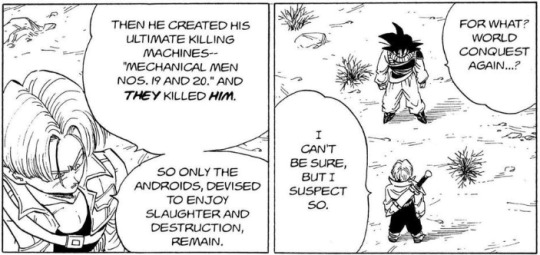
This isn't a Viz-ism, either. He says "19 and 20" specifically in the original Japanese.
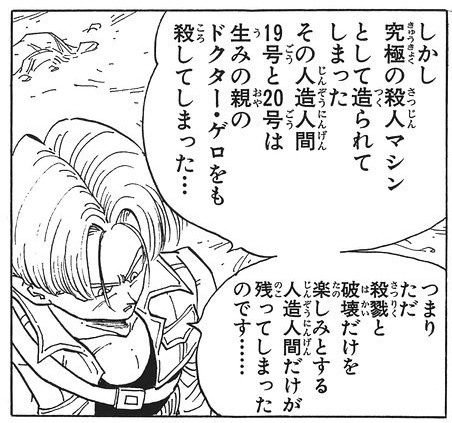
Those two Androids, not 17 and 18, are the ones ravaging his future. However, as is commonly known, Toriyama's editor former editor and currently a trusted friend Kazuhiko Torishima was unimpressed by the Androids' design.
The funny thing is, this isn't the only glaring plot hole that the abrupt shift in plot created. It's easy to pin down 20's flight to his lab as the moment Toriyama switched gears, because he's forced to bring in Bulma to rerail it onto the new story - creating another massive plot hole in the process regarding what Bulma knows.
See. In addition to Trunks clearly identifying 19 and 20 as the Androids, this scene three years in the past had another moment that becomes an issue later on. It's when Bulma says this:
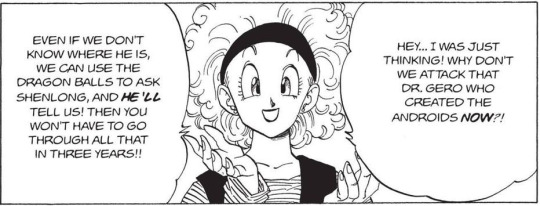
See, Trunks has explained that Dr. Gero is creating the Androids as we speak and will set them upon everyone in three years' time. Bulma suggests having Shenron reveal the location of Gero's lab, and then they can all run off and gank him.
She gets voted down because Goku, Vegeta, and Tenshinhan are all super interested in fighting these Androids.


Goku tries to spin some guff about a moral reservation but he adds that in as an afterthought. His kneejerk is that he wants to fight. It's Krillin who ultimately succeeds in talking Bulma down, via some 4-D chess maneuvers against Vegeta.
Krillin's planning on using the Androids as a common cause to trick Vegeta into becoming one of the gang.
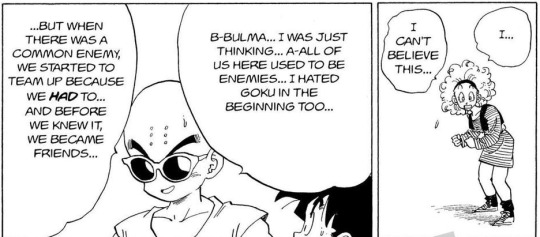

Which. Y'know. Goes off without a hitch, honestly. Krillin is a tactical genius and all-a y'all owe him respect. He manipulated Vegeta straight into that redemption arc.
In any case, this is where Trunks's warning leaves us: In three years' time, Dr. Gero will unleash 19 and 20 who will kill us all. If we knew where he was, we could do something about it, but the will to actually do that isn't there.
So.
Three years later, during the fight with 20, he uses Bulma as a distraction to make his escape. Upon rescuing her, Bulma's able to positively ID 20 as the doctor himself.
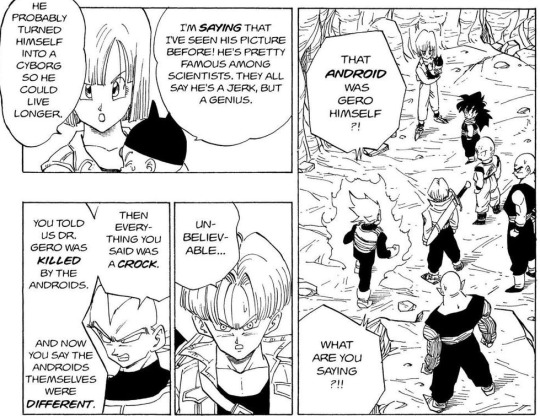
More than that, she knows exactly where he lives because he's a famous celebrity whose personal information gets talked about in the scientific community.
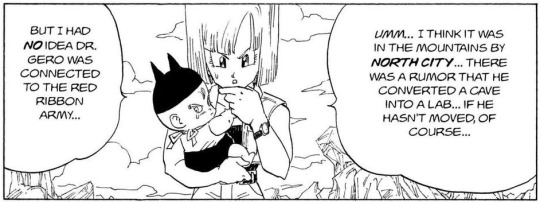
She just never brought it up before because no one ever said Dr. Gero was involved in any of this.
This is an even bigger HOOOOOOLY SHIT than the clear identification of the Androids' serial numbers. What Bulma knows flipped between these chapters.
So we make our way to Gero's lab to meet the arc's Actual Villains For Realsies, 17 and 18.
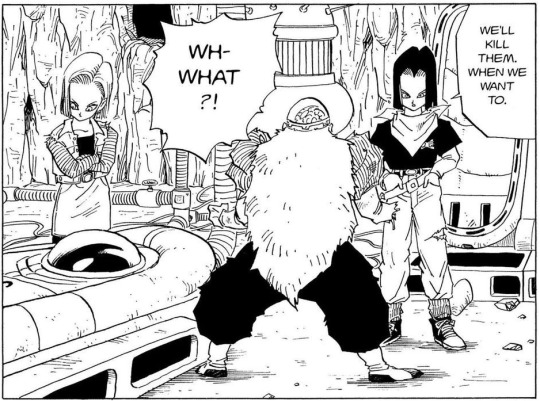
As a sidenote, not to be outdone in jankiness by Goku dropping the Senzu into a pocket dimension earlier, Toei has Dr. Gero's broken-off right hand occasionally regenerate by magic in this scene.
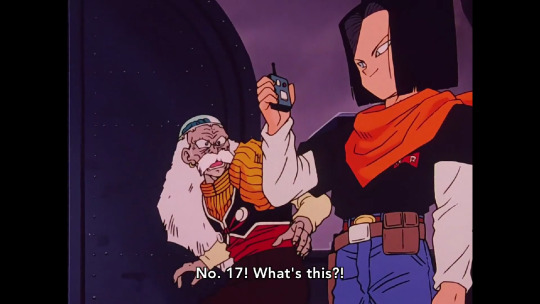
This arc is rough for everyone.
In any case, this brings us to the awakening of 16.

At this point in time, the retcon has finished taking effect; 17 and 18 are now retroactively the Androids from Trunks's future, but 16 is something different. Another Android that Trunks has never heard of before.
Dr. Gero practically pisses himself with terror when the prospect of 16 being awakened comes up.
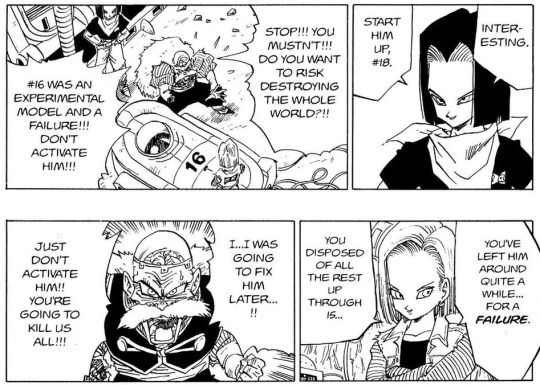
In the same breath that Toriyama rewrites 17 and 18 to be the True Actual Villains For Realsies of the arc, he also introduces the enigmatic 16. All we know of him is that Gero believed he was a malfunctioning, uncontrollable failure whose awakening would threaten the whole planet.
The Twins question 16 about the true threat he represents.
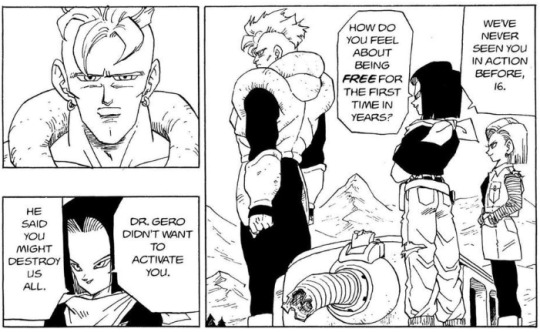
But all he has to offer in response is this... eerie smile, as if he knows something he isn't sharing.

Answering "Are you going to kill us all" with a smug grin is fucking ominous. Shortly after, we learn that whatever 16's malfunction is, it scared Gero so much that he never made another of the same kind of thing that 16 is again.
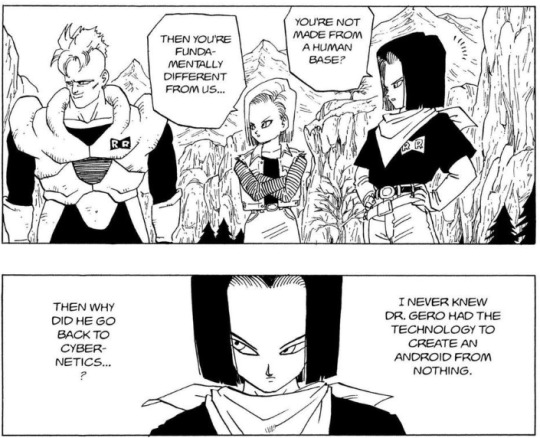
What went so horribly wrong that it spooked Gero into trying out human base models and? It's worth noting that while Gero did go back to the mechanical design for 19, he considered the subsequent failures of 17 and 18 following whatever happened with 16 to be sufficient reason to can the Infinite Energy design entirely.
Android 16 is the most formidable design Gero ever created to kill Goku with. And he refused to ever make another like him again.
Current Dragon Ball lore, per interviews with Toriyama, say that he didn't want 16 released because 16 has sentimental value to him. But that doesn't explain why he didn't make other Androids like 16, and these panels themselves are telling a very different story. They're hyping up the mystery of 16 to be the true ultimate threat of this arc - At least, once he finally gets a chance to meet his one true adversary.

However, this doesn't last. Torishima didn't like the Twins as villains either so Cell was created instead. It was later revealed that 16 was very strong and also has a bomb in his chest that would wipe out a small portion of the countryside.
But the nature of this terrifying and enigmatic threat to the planet sure to unfold if 16 awakens, something so terrible that Gero was afraid of ever making an Android like 16 again, would be lost to the cutting room floor.
68 notes
·
View notes
Text

Introducing Wendigo
Kortac OC - been working on a xRoze fic with her....
...dreamy sigh...
contains mention of rape , csa , murder , torture

IDENTIFICATION PROFILE: KATYA AVERYANOV
Agent Name / I.D. Number:
Katya Averyanov / KTACRS-334999
Authorization Level:
High
Callsigns / Aliases:
Wendigo, фарфор
Pronouns:
She/Her
Ethnicity:
Ukrainian
Nationality:
Russian
Date of Birth:
March 21st, 1998
Height:
190 cm
Notable Features:
Porcelain-like skin, doll-joint tattoos across elbows, knees, and wrists; long platinum hair, usually braided; eyes that have been described as “haunted glass.”
Languages:
Fluent in Russian and English; conversational German
Weapons Proficiency:
Sniper rifle, semi-automatic pistol
Combat Training:
Wing Chun, Brazilian Jiu-Jitsu, knife work
Military Rank:
Podpolkovnik (Lieutenant)
Service History:
12 years, 9 months active duty
Psych Profile / Personality Overview
Katya is soft-spoken to the point of silence, preferring not to engage in idle conversation. This silence should not be mistaken for passivity—beneath her distant demeanor lies an individual shaped by trauma, calculation, and cold survival. She frequently dissociates during briefings and moments of inactivity, leading to multiple disciplinary write-ups. However, this dissociation is often followed by bursts of hyper-focus in the field.
She thrives in solo operations, particularly surveillance and long-term embedded missions. Despite her eerie calm and doll-like appearance, Katya is feral in combat, known to kill with her teeth, favoring throat-ripping as a kill method—a practice as psychological as it is physical.
Though feared by many within KORTAC, some agents have begun to whisper that she isn't simply broken. She's waiting.
Backstory Summary
Much of Katya’s early life remains unrecorded or redacted. At age 10, she was seized by the Russian government under suspicion of domestic instability and potential military use. She entered the Russian Armed Forces as an informal conscript. By age 12, she had already begun receiving infractions for insubordination and curfew violations.
From ages 17 to 20, she was listed MIA. It was later revealed that she had been held captive, tortured, and raped repeatedly by members of an enemy faction. Her escape—facilitated by grinding her own teeth to points on cell bars—was marked by an unrelenting slaughter of her captors.
At 21, following several psych evaluation failures and attacks on commanding officers who she claimed were abusers, Katya was honorably discharged. She vanished briefly before resurfacing under the private military sector with KORTAC, where she was assigned the callsign Wendigo.
Notable Incident:
During a mission with agents König, Rose, and Hutch, Katya was separated. Upon her recovery nearly 46 minutes later, she had killed an enemy combatant mid-sexual assault, ripping out his throat and castrating him with her teeth. Roze and Hutch described the scene as "unholy," with Roze noting, “I ain't never seen anything like that before.”
Psychological Patterns
Fears:
Men in positions of power
Prolonged silence
The dark
Confined spaces
Being watched by large groups
Regrets:
Killing, even if deserved
Joining KORTAC
Not dying when she had the chance
Goals:
To escape: new identity, new face, new life
To eventually start a family (she dreams of a child who looks nothing like her)
To stop killing before it consumes what’s left of her humanity
Interests / Soft Spots
When not on assignment, Katya volunteers quietly at a local orphanage. She allows children to braid her hair and has been known to protect them with vicious efficiency—several would-be predators have been found dead, bearing what medical examiners call “nonhuman bite patterns.”
Katya enjoys:
Classical music (especially Prokofiev and Mahler)
Children’s drawings (keeps a notebook full of them)
Soft fabrics (her bedding is all velvet)
Old spy thrillers and romance novels, which she reads in secret
Additional Notes (Unofficial)
Agent Roze reportedly tried to befriend Katya. She did not respond, but she left her a bloodied knife after a successful op with a sticky note that read: “You talk too much. I like that.”
Agent Hutch once described her as “a ghost wearing a porcelain mask. Real quiet. Real hungry.”
Art
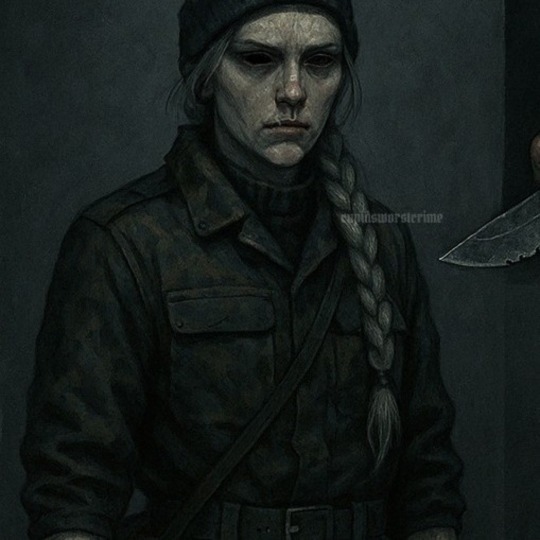
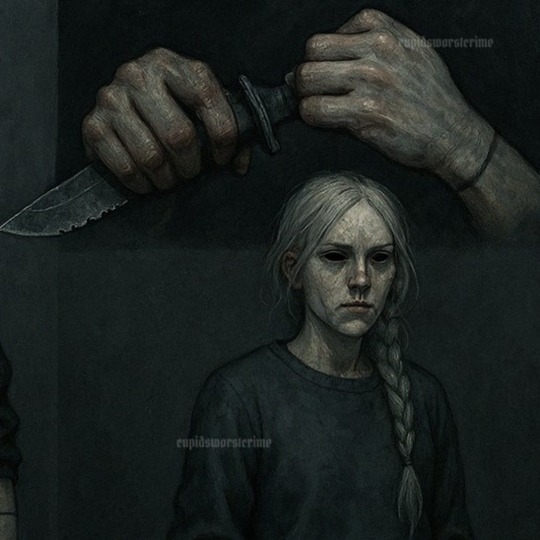
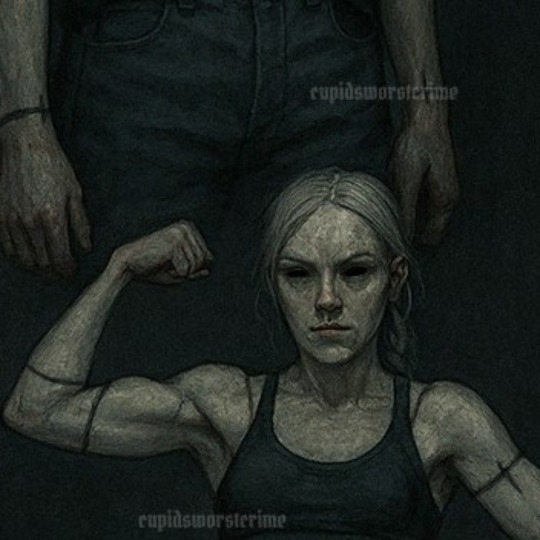


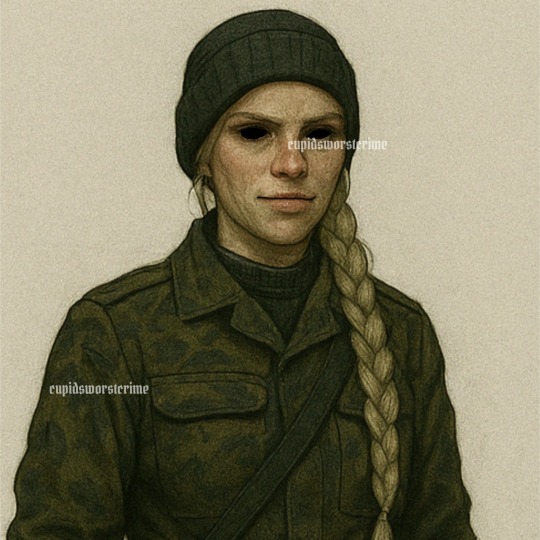
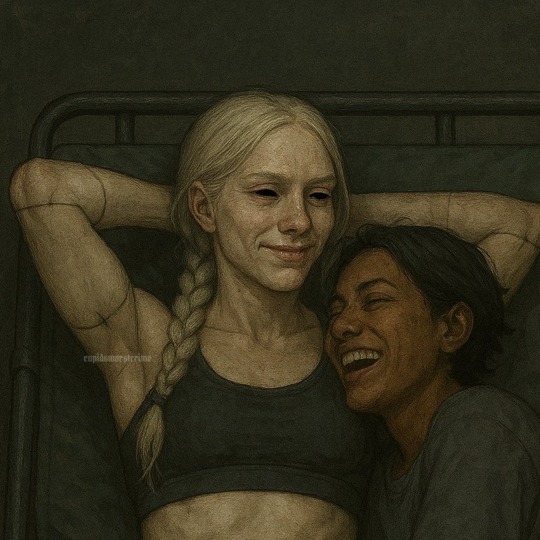
i draw her with her eyes blacked out (unless her eyes are the focus) because i like to think im drawing how she sees herself (soulless & inhuman)
#cod oc#kortac oc#call of duty oc#kortac original character#call of duty original character#cant stress enough she is my mind spawn#oc#oc art#female oc#female original character#original character
10 notes
·
View notes
Text
The Israeli attack on a humanitarian convoy in Gaza in early April that killed seven aid workers with the U.S.-based aid group World Central Kitchen has ignited a fierce global backlash against Israel’s policies of engagement in the territory. The attack involved the successive firing of three missiles at three vehicles, driven by suspicions of a Hamas combatant’s presence within the convoy, according to reports.
In Israel, the event is being portrayed as an accident, “a grave mistake stemming from a serious failure due to a mistaken identification, errors in decision-making, and an attack contrary to the Standard Operating Procedures,” as the Israeli military’s investigation team concluded. In humanitarian circles, it is seen as evidence of a culture that “treats Gaza as a free-fire zone with total impunity for gross attacks on civilians,” as Jeremy Konyndyk, the president of Refugees International who served in both the Obama and Biden administrations, has suggested.
But for the discussion to be useful, it should progress beyond these immediate interpretations to examine the deeper cultural patterns underlying such incidents. Most crucially, it must scrutinize the shift in military policy and ethos that can be traced back to the Elor Azaria affair of 2016-17. Azaria was an Israeli conscript who was captured on video executing a wounded and immobilized Palestinian assailant in Hebron. The Israeli military prosecuted Azaria for manslaughter and sentenced him to 18 months in prison.
While the case demonstrated the military’s commitment to its own ethical codes, it also sparked widespread protests from right-wing factions and a general backlash against military procedures. The army was accused of failing to support Azaria and creating a culture in which soldiers would hesitate to use force against Palestinian militants. To counter this claim, and from that point forward, the military began to announce the number of Palestinian fighters killed in its operations, demonstrating that its forces did not hesitate to engage.
Under the leadership of the military’s chief of staff, Aviv Kochavi, from 2019 to 2023, the killing-based criteria were reinforced. Kochavi’s goal was to remake the army into a “lethal, efficient, and innovative” fighting force—in other words, a death-generating army. He promoted this vision by enhancing the precision of weapon systems, improving the coordination between forces and intelligence, and increasing the rate of fire.
Kochavi’s directive for field commanders to assess, at the end of each combat phase, the number of enemy forces killed and objectives destroyed—rather than solely focusing on territorial conquest—signified a shift toward necrotactics, where the primary goal of military engagement is killing the enemy. Killing becomes not just an outcome of warfare but its principal aim.
The approach of using body counts as a metric of success has notably intensified during the current war. Soon after the Oct. 7 attack, the Israeli military began consistently reporting the number of Hamas fighters killed, echoing the way U.S. generals announced enemy fatalities during the Vietnam War—a scenario where traditional metrics for evaluating combat success are elusive, thus making the body count, rather than the strategic objectives achieved, the primary indicator of success. This was particularly evident as the Israeli death toll ticked up and the stated objective of dismantling Hamas appeared increasingly unattainable.
In fact, the military appears to have established a quantitative goal from the outset. According to the journalist Yuval Abraham in +972 Magazine, the Israeli army developed an artificial intelligence-based program named Lavender, designed to identify targets for assassination. This system tagged approximately 37,000 Palestinians in Gaza as suspected militants, marking their residences (and therefore their families as well) for potential airstrikes. The deployment of Lavender contributed to the deaths of around 15,000 Palestinians in the war’s first six weeks, according to the report.
By setting a numerical target, the Israeli military shifted from viewing outcomes as a measure of progress—like neutralizing the threat posed to Israel from Gaza—to making body counts the main standard. The trend has been reinforced by a pervasive adoption of the language of killing among military commanders. “Now we will go forward and kill them all,” Brig. Gen. Roman Goffman was quoted as saying just before the ground operation in Gaza began, in just one prominent example.
As Israel faces an impasse in Gaza, lacking a politically articulated exit strategy, the reliance on killing and its quantification as a metric for success becomes increasingly pronounced, leading to the erosion of operational constraints. This shift was evident in the recent raid at Shifa Hospital in Gaza City, which inflicted extensive damage to Gaza’s most crucial health care infrastructure. The hunt for Hamas members has, to a significant degree, become an end in itself, complicating the dynamics of the conflict and placing military objectives above political resolutions.
This shift provides some context for the tragic killing of the aid convoy team—though it makes it no less disturbing. Once one or two armed individuals were spotted in the convoy, their neutralization became a top priority, apparently eclipsing overarching strategic considerations—factors that should have been incorporated at the tactical level. Fundamentally, such a situation warranted an approach aimed at preventing civilian casualties, especially along a deconflicted route designated for humanitarian aid delivery and when no direct threat was posed to Israeli troops. Moreover, the overarching political rationale should have prioritized safeguarding humanitarian missions, given the potential repercussions for Israel’s global standing amid the crisis in Gaza.
Yet the events unfolded with a seeming obsession for lethal action, as vividly illustrated by reporting in the Israeli newspaper Haaretz: Upon spotting a gunman or two, Israeli forces targeted three successive vehicles from the air. After the first one was hit, passengers moved to a second vehicle, which was then struck by a missile. And when the wounded were transferred to a third vehicle, it too was fired on. This appears to be a case of obsessive kill confirmation, overshadowing the principles of necessity, proportionality, and the sanctity of civilian life.
Hence, the fundamental issue extends beyond merely revising the rules of engagement or monitoring their application more closely, as such measures alone would prove inadequate to prevent future incidents. The problem also transcends the flawed assumption that every part of Gaza can be considered a free-fire zone where engaging Palestinian militants indiscriminately is justified. What is crucial is dismantling the prevailing culture that equates killing with military success.
Yagil Levy is a professor of political sociology and public policy at the Open University of Israel. His most recent book in English is: Whose Life Is Worth More? Hierarchies of Risk and Death in Contemporary Wars.
75 notes
·
View notes
Text
⌕The Unbroken Branch 1.5
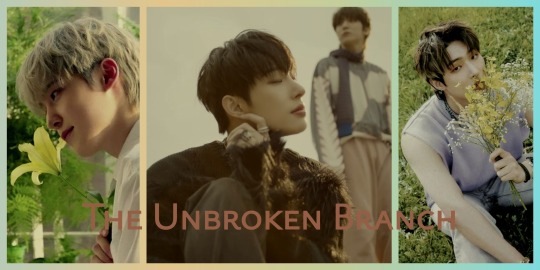

genre -- Hunger Games AU pairing -- poly! yunho x mingi x fem!reader warnings -- murder, metal health, injuries, mentions of food and weigth...

!!!!!!!!!disclaimer this ff was written with me and my friend's ideas put into gemini. We edited the chapters and changed some of the writing style by hand. We wrote it for ourselves but seeing that it turned out well we thought we might share! (we don't get any credit) Thank you Gemini for keeping us delulu -d&n deviders

The Victor's Price: Part 1
In the unforgiving realm of Panem, where life hangs by a thread and fate is drawn from a glass bowl, a quiet healer from District 7 is thrust into the 73rd Hunger Games. Burdened by an old injury and a deep-seated anxiety, she faces overwhelming odds, dismissed by many as weak. Yet, beneath her quiet demeanor lies a sharp mind, honed by observation and a forbidden knowledge of the natural world.
As the Games unfold, she navigates a brutal arena not with brute strength, but with a cunning born of desperation. Watched by a former victor with a golden reputation and another scarred by his own arena demons, she must make impossible choices, embracing the darkness required for survival. But even if she wins, what is the true cost of victory? And can a heart survive the very acts it commits to live?

Series Masterlist
Chapter 5: _The Test_
The morning of the private assessments arrived with a heavy sense of inevitability. Y/n had barely slept, despite the nightcap and Yunho's calming words. His encouragement had given her a fragile shield against the dread, but the fear of failure, of publicly confirming Johanna's low opinion of her, still gnawed.
She put on her uniform carefully, Capitol-issued but unadorned. It wouldn't hide her limp, but it wouldn't draw unnecessary attention either. Her injured ankle throbbed with a dull ache, a constant, physical manifestation of her vulnerability.
-
When her turn came, she walked into the assessment room, a vast, circular space under a high dome. The Gamemakers sat on elevated chairs, a semicircle of bored, overdressed figures. Their faces were painted in garish colors, their expressions ranging from glazed indifference to mild curiosity. They were snacking, sipping drinks, their attention divided.
They saw hundreds of tributes; she was just another one.
Anthony went before her, and she could hear the clang of metal, the sharp thud of axes hitting targets. He was loud, direct, demonstrating the lumbering skills of District 7.
Now, it was her turn.
Y/n took a deep breath. She glanced at the various stations. The combat dummies seemed to mock her. The climbing wall loomed impossibly high. She knew she couldn't compete there. Instead, she walked deliberately to the plant identification station. It was less flashy, less impressive, but it was her strength.
She moved with a quiet efficiency, her fingers tracing the delicate veins of leaves, her eyes swiftly identifying poisonous berries and their medicinal counterparts.
She quickly and correctly identified all the deadly nightlock, then the various types of hemlock, pointing out their distinct characteristics. She then shifted to the healing herbs, demonstrating how to prepare a poultice from a crushed leaf, describing its properties in a low, clear voice that, surprisingly, carried across the vast room.
The Gamemakers barely reacted, their attention still on their platters of food.
Then, she moved to the water purification station. She systematically cleaned a dirty water filter, explaining each step, her movements precise. She then demonstrated how to construct a makeshift filter from natural materials, describing the types of sediment and biological contaminants it would remove. Still, little reaction from the elevated panel.
A flicker of desperation seized her. She remembered Yunho’s words: show them what you know. What did she know that others wouldn't? Her sleepless nights. Her medical knowledge.
She walked towards a display of various tools. Her eyes landed on a collection of small, sharp needles, typically used for stitching wounds.
With a sudden, audacious impulse, she selected a few, along with some thin, sturdy thread. She found a private corner, away from the more active stations. With her back partially to the Gamemakers, she worked quickly, her hands deft.
She retrieved a small, pre-prepared pouch from an inner pocket of her tunic, hidden carefully from the stylists. Inside were the insomnia capsules she had painstakingly crafted, binding them to the roof of her mouth for days, ensuring they were not water-soluble. They were tiny, barely perceptible.
With practiced precision, she began to bind a few of these capsules to the fine threads, creating tiny, almost invisible packets. She then demonstrated, as if for the Gamemakers, how one might discreetly attach these packets to the underside of certain leaves or the rim of a water source, or how one might slip them into a drink.
She didn't explain their contents, but her silent demonstration spoke volumes of subtle, lethal intent. Her movements were fluid, chillingly effective, a stark contrast to her earlier clumsiness.
She looked up at the Gamemakers. One of them, a man with a ridiculous plumed hat, finally put down his wine glass, his eyes narrowing slightly. Another stopped chewing. For a brief moment, they seemed to genuinely see her, not as a weak girl from District 7, but as something else entirely. A silent, knowing nod passed between a few of them. She held their gaze for a beat longer, then, with a quiet confidence that surprised even herself, she returned to the center of the room, bowed, and exited.
Back in her apartment, the silence was deafening. She felt an odd mix of exhaustion and a strange surge of adrenaline.
She had done it.
She had shown them her kind of fight. The Gamemakers' score would soon follow, a number that would echo across Panem. She knew it wouldn't be high, not compared to the Careers. But perhaps, just perhaps, it would be exactly what she needed.

#poly ateez x reader#ateez ff#ateez x reader#poly ateez#yungi x reader#ateez x chubby reader#yunho x reader#mingi x reader#ateez imagines#hunger games au#ateez huger games#ateez hunger games au#ateez series#ateez fluff#ateez angst#the unbroken branch#tub
10 notes
·
View notes